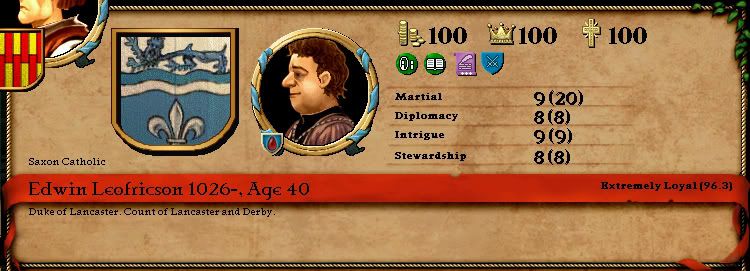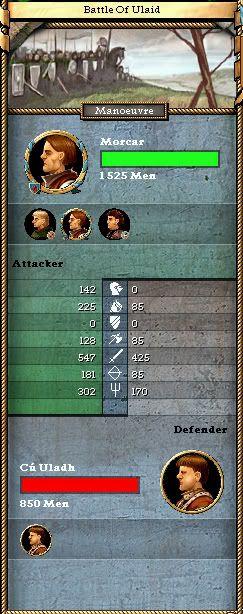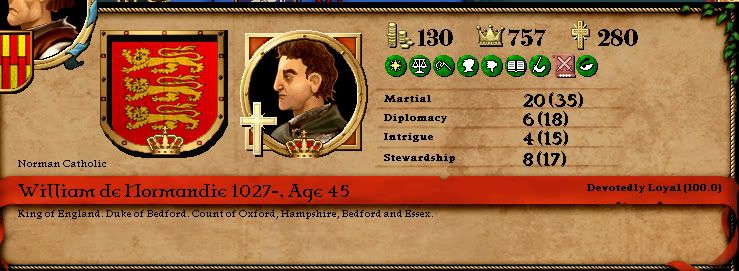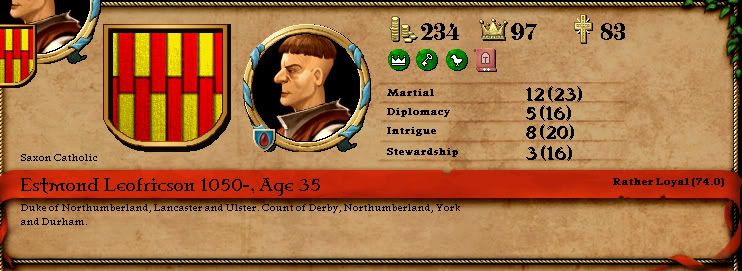At the bar "P*sk* Kaupunni" in Oulu, 2008
Albert: Hey, angel. Do I come *hic* do I come here often?
Jaana: Get lost, you drunkard.
Albert: Don't you... know who I am, missh?
Jaana: That I do not, sir. Now would you please move along, I am trying to have a pleasant evening here with my friends.
Albert: You shee, ma'am, I am the Lasht Shaxon, the heir of the Leofric - *hic*-shons!
Jaana: And I am lord Blackadder. Baldrick, would you bring me my, extra strong ale!
Albert: You don't *hic* believe me? Shee this ring. That's the Leofricshon's coat of armsh!
Would the beautiful lady want to hear the shtory of my dynashty? *hic*
Jaana: Hmmm, it could be amusing. Well, fire away. But I still won't sleep with you.
Albert: That'sh a given, milady. Now, prepare your earsh for an amazing sthory of bravery, intrigue, *hic* love and warsh. You shee, *hic* my dynashty ushed to be magnificent, ushed to rule over vasht landsh, ushed to be enormoushly wealthy! *hic*
The Era of Two Brothers
Our shtory startsh in England in the *hic* mid-11th century, a turbulent time which shaw kingsh rise and fall. Edwin Leofricshon wash the earl of Mercia after the death of hish father, Alfgar. Northumderland was ruled by *hic* Toshtig Godwinshon, the brother of Harold Godwinson, later the king Harold II. He wash hated by hish shubjects, hatred which culminated in an open rebellion in 1065. Northumbrian peashants elected Edwinsh younger brother *hic* Morcar ash their leader. The rebellion wash shucceshful and Edwin wash proclaimed ash the earl of *hic* Northumbria. King Edward the Confesshor shend Toshtig'sh brother Harold to negotiate with rebelsh. Harold "realished" that hish brother wash too unpopular to rule over North- *hic* Umbria and pershuaded king Edward to agree to rebelsh demandsh. It ish speculated why Harold shold out hish brother. He wash married to Morcar'sh shister Edith which could have influenced hish decishion. Alsho it ish spheculated that Toshtig wash an obshtacle to Harold'sh planned rishe to become the king of England. Sho Morcar retained hish title and Toshtig wash declared a criminal. After Toshtig wash defeated by Morcar and Edwin after raiding the countryshide of Mercia with hish loyal troopsh, he fled to hish friend king Malcolm III of Shcotland and alsho gained the shupport of Norwegian king *hic* Harald III Hardrada. With hish newfound alliesh Toshtig attacked northern England again in 1066 and won the battle of Fulford againsht the brothersh Edwin and Morcar. But thish expedition wash defeated by Toshtig's brother Harold Godwinson, by then proclaimed the *hic* king, at the battle of Shtamford Bridge.
But a new enemy wash coming from Normandy in shape of *hic* duke William the Conqueror who defeated the *hic* Harold'sh tired troopsh jusht coming from the battle of Shtamford Brigde at the battle Hashtingsh. William wash now proclaimed the king of England and quickly began *hic* reshaping the country'sh shtructuresh by replacing old Shaxon noblesh by hish Norman elite. But for shome reashon or another, Edwin and Morcar retained their landsh, now duchiesh of Lancashter and Northumberland. In any cashe, the two brothersh were determined to drive the Norman invader out of England, by *hic* any means necesshary. They were in legal shense vassalsh of William the Conqueror but deep mishtrusht reigned between the two brothersh and king William.

Morcar Leofricsson, the earl of Northumberland 1065-1075
In 1067, after long discussionsh with hish brother, Edwin decided to *hic* declare hish duchy of Lancashter *hic* independent. Morcar remained "loyal" to William but wash ready to join hish brother were he attacked by English forcesh. In shilence Morcar *hic* shearched for alliesh againsht the vile invader, men shuch as the duke of Oxford Waltheof Shivard, Goshpatrick of Atholl, a good friend of Shcottish *hic* king and the count of Berwick in southern Shcotland and Ralph de Gael, count of *hic* Norfolk. Theshe men would form the core of anti-William resishtance.
But besidesh the shuccesful seceding of *hic* Lancashter, the year 1067 would bring alsho dire newsh to Shaxon brothersh. Pope Alexander II died and hish *hic* shuccesshor, Pope Gregory VII, wash a good friend to William the Bashtard and sho William posseshed the mosht dreaded weapon of the *hic* medieval timesh, excommunication. And shure enough, quickly the excommunication of *hic* Williamsh enemiesh began, mosht *hic* notable pershon being the duke of Oxford. The brothersh had to be careful to *hic* avoid the dreaded excommunication.

Edwin Leofricson the Pious, (Sankt Edwin) the earl of Mercia (Lancaster) 1062-1075, the duke of Northumberland and Lancaster 1075-1084
Ash William decided not to invade Edwinsh independent duchy, both brothersh shtarted building up their landsh in the wait for the right time to shtrike, improving the infrashtructure, building up armiesh and *hic* shtabilishing the land in the chaotic aftermath of Norman invashion. Thish low-profile life continued *hic* until 1070 when Morcar attacked the kingdom of Ulaid in *hic* Ireland. The official reashon for thish war wash Morcar'sh claim to the throne through hish grandfather Leofric *hic* Leofricsshon, firsht earl of Mercia, who wash shupposedly a shon of then reigning king of Ulaid. Later it wash found out thish claim wash forged and had no basish on reality. Actually Morcar'sh reashon for invading wash hish deshire to *hic* create a Shaxon kingdom to Ireland and draw Irish *hic* manpower to hish shtruggle againsht Normansh. Edwin contributed to *hic* invashion with 200 of hish best warriorsh but thish aid was kept a shecret. William wash shuspicous of Morcar'sh motivesh but once again he did not *hic* act. It ish shpeculated that hish unwillingnessh to commit forcesh against Shaxon brothersh wash due to the fact that hish kingdom wash shtill very unshtable and invading two mosht prominent Shaxons would provoke an open rebellion.

The Battle of Ulaid ended in defeat of king Cu Uladh Ui Flaitkri and as a result kingdom of Ulaid ceased to be
The battle of Ulaid shaw 1500 Shaxons under duke Morcar outflank 850 Irish warriorsh under king Cu Uladh Ui Flaitkri. The Irish had *hic* taken good defenshive positionsh on a hill. Morcar shent hish huscarls onwardsh and simultaneoshly outflanked Irish warriorsh with hish heavily armored cavalry in a classhic pincer manouvre. Battle wash over quickly and only 64 Shaxons were dead on the *hic fieldsh compared to over 400 Irishmen. In April 1071 the castle fell and Morcar could call Ulaid hish pershonal demeshne. Thish invasion shtarted the sheries of warsh fought on Eire by Leofricshon dynashty that sheeked to unite the Green *hic* Ishle under one banner.
In 1072, the anti-William resishtance ashembled in a shecret meeting at York to dishcussh about actionsh for dishthroning William. Walther, the duke of Oxford wash backing an outright *hic* rebellion by all dukesh and countsh who opposhed William. Ralph de Gael backed thish *hic* plan but the othersh weren't sho shure about their ability to defeat king William who shtill had many shtrong friendsh and a big army. Alsho William wash known ash one of the greatesh generalsh to ever have lived. Richard the Normandie, shon of William and count of Chester, proposhed the asshasshination of *hic* William but the brothersh were againsht thish since it would only replace one *hic* Norman with another. Eventually the plan proposhed by Goshpatrick of Atholl all agreed upon wash Morcar *hic* seceding from William and joining the kingdom of Schotland ash the vasshal of of king Malcolm III, an old backer of Toshtig. From inshide Shcotland he would work againsht William. William loshing the duchy of Nurthumderland would be *hic* enough to shwing the balance of power on the British Ishlesh in favour of Schotland. With the help of king Malcolm III, Marcor would invade *hic* England and drive William back to where he *hic* came from.

British Isles in 1072
Meanwhile king William wash plotting plansh of hish own and got Edwin excommunicated thanksh to hish friend Pope Gregory VII. Later on thish excommunication wash revoked by Pope Gregory VII's shuccessor Anselm of Lucca who ruled ash Shergius Vth. Alsho William financed the rebellion by duke of Moray Maelsnechtan Loarn in 1075 but it wash eventually quelled by king *hic* Malcolm with the help of duke Morcar. Thish wash to be the lasht campaign of Morcar ash he peacefully died to old age during thish expedition to Northern Schotland. Having shired three beautiful daughtersh but no boysh with hish Welsh wife Blodwen, hish realm entered the handsh of hish brother, Edwin. Thish ended the era of Two Brothersh in the hishtory of my dynashty. From thish point on, there would be one *hic* unified Leofricshon realm.

William the Conqueror, the king of England 1066-1100
Jaana: Ohh damn, your fascinating story made me miss the last bus! And my friends have left too. Plus the taxis are so damn expensive these days. Ohh well, quess I must open my purse. This will really hurt my student's budget.
Albert: You shee, I live very near. We could walk *hic* to my place and you could shober up over *hic* night and go home in the morning.
Jaana: Hmm, ok. You seem like a decent guy afterall.
But no sex, is that clear?
Albert: Shure is, ma'am.
Albert: Hey, angel. Do I come *hic* do I come here often?
Jaana: Get lost, you drunkard.
Albert: Don't you... know who I am, missh?
Jaana: That I do not, sir. Now would you please move along, I am trying to have a pleasant evening here with my friends.
Albert: You shee, ma'am, I am the Lasht Shaxon, the heir of the Leofric - *hic*-shons!
Jaana: And I am lord Blackadder. Baldrick, would you bring me my, extra strong ale!
Albert: You don't *hic* believe me? Shee this ring. That's the Leofricshon's coat of armsh!
Would the beautiful lady want to hear the shtory of my dynashty? *hic*
Jaana: Hmmm, it could be amusing. Well, fire away. But I still won't sleep with you.
Albert: That'sh a given, milady. Now, prepare your earsh for an amazing sthory of bravery, intrigue, *hic* love and warsh. You shee, *hic* my dynashty ushed to be magnificent, ushed to rule over vasht landsh, ushed to be enormoushly wealthy! *hic*
The Era of Two Brothers
Our shtory startsh in England in the *hic* mid-11th century, a turbulent time which shaw kingsh rise and fall. Edwin Leofricshon wash the earl of Mercia after the death of hish father, Alfgar. Northumderland was ruled by *hic* Toshtig Godwinshon, the brother of Harold Godwinson, later the king Harold II. He wash hated by hish shubjects, hatred which culminated in an open rebellion in 1065. Northumbrian peashants elected Edwinsh younger brother *hic* Morcar ash their leader. The rebellion wash shucceshful and Edwin wash proclaimed ash the earl of *hic* Northumbria. King Edward the Confesshor shend Toshtig'sh brother Harold to negotiate with rebelsh. Harold "realished" that hish brother wash too unpopular to rule over North- *hic* Umbria and pershuaded king Edward to agree to rebelsh demandsh. It ish speculated why Harold shold out hish brother. He wash married to Morcar'sh shister Edith which could have influenced hish decishion. Alsho it ish spheculated that Toshtig wash an obshtacle to Harold'sh planned rishe to become the king of England. Sho Morcar retained hish title and Toshtig wash declared a criminal. After Toshtig wash defeated by Morcar and Edwin after raiding the countryshide of Mercia with hish loyal troopsh, he fled to hish friend king Malcolm III of Shcotland and alsho gained the shupport of Norwegian king *hic* Harald III Hardrada. With hish newfound alliesh Toshtig attacked northern England again in 1066 and won the battle of Fulford againsht the brothersh Edwin and Morcar. But thish expedition wash defeated by Toshtig's brother Harold Godwinson, by then proclaimed the *hic* king, at the battle of Shtamford Bridge.
But a new enemy wash coming from Normandy in shape of *hic* duke William the Conqueror who defeated the *hic* Harold'sh tired troopsh jusht coming from the battle of Shtamford Brigde at the battle Hashtingsh. William wash now proclaimed the king of England and quickly began *hic* reshaping the country'sh shtructuresh by replacing old Shaxon noblesh by hish Norman elite. But for shome reashon or another, Edwin and Morcar retained their landsh, now duchiesh of Lancashter and Northumberland. In any cashe, the two brothersh were determined to drive the Norman invader out of England, by *hic* any means necesshary. They were in legal shense vassalsh of William the Conqueror but deep mishtrusht reigned between the two brothersh and king William.

Morcar Leofricsson, the earl of Northumberland 1065-1075
In 1067, after long discussionsh with hish brother, Edwin decided to *hic* declare hish duchy of Lancashter *hic* independent. Morcar remained "loyal" to William but wash ready to join hish brother were he attacked by English forcesh. In shilence Morcar *hic* shearched for alliesh againsht the vile invader, men shuch as the duke of Oxford Waltheof Shivard, Goshpatrick of Atholl, a good friend of Shcottish *hic* king and the count of Berwick in southern Shcotland and Ralph de Gael, count of *hic* Norfolk. Theshe men would form the core of anti-William resishtance.
But besidesh the shuccesful seceding of *hic* Lancashter, the year 1067 would bring alsho dire newsh to Shaxon brothersh. Pope Alexander II died and hish *hic* shuccesshor, Pope Gregory VII, wash a good friend to William the Bashtard and sho William posseshed the mosht dreaded weapon of the *hic* medieval timesh, excommunication. And shure enough, quickly the excommunication of *hic* Williamsh enemiesh began, mosht *hic* notable pershon being the duke of Oxford. The brothersh had to be careful to *hic* avoid the dreaded excommunication.

Edwin Leofricson the Pious, (Sankt Edwin) the earl of Mercia (Lancaster) 1062-1075, the duke of Northumberland and Lancaster 1075-1084
Ash William decided not to invade Edwinsh independent duchy, both brothersh shtarted building up their landsh in the wait for the right time to shtrike, improving the infrashtructure, building up armiesh and *hic* shtabilishing the land in the chaotic aftermath of Norman invashion. Thish low-profile life continued *hic* until 1070 when Morcar attacked the kingdom of Ulaid in *hic* Ireland. The official reashon for thish war wash Morcar'sh claim to the throne through hish grandfather Leofric *hic* Leofricsshon, firsht earl of Mercia, who wash shupposedly a shon of then reigning king of Ulaid. Later it wash found out thish claim wash forged and had no basish on reality. Actually Morcar'sh reashon for invading wash hish deshire to *hic* create a Shaxon kingdom to Ireland and draw Irish *hic* manpower to hish shtruggle againsht Normansh. Edwin contributed to *hic* invashion with 200 of hish best warriorsh but thish aid was kept a shecret. William wash shuspicous of Morcar'sh motivesh but once again he did not *hic* act. It ish shpeculated that hish unwillingnessh to commit forcesh against Shaxon brothersh wash due to the fact that hish kingdom wash shtill very unshtable and invading two mosht prominent Shaxons would provoke an open rebellion.

The Battle of Ulaid ended in defeat of king Cu Uladh Ui Flaitkri and as a result kingdom of Ulaid ceased to be
The battle of Ulaid shaw 1500 Shaxons under duke Morcar outflank 850 Irish warriorsh under king Cu Uladh Ui Flaitkri. The Irish had *hic* taken good defenshive positionsh on a hill. Morcar shent hish huscarls onwardsh and simultaneoshly outflanked Irish warriorsh with hish heavily armored cavalry in a classhic pincer manouvre. Battle wash over quickly and only 64 Shaxons were dead on the *hic fieldsh compared to over 400 Irishmen. In April 1071 the castle fell and Morcar could call Ulaid hish pershonal demeshne. Thish invasion shtarted the sheries of warsh fought on Eire by Leofricshon dynashty that sheeked to unite the Green *hic* Ishle under one banner.
In 1072, the anti-William resishtance ashembled in a shecret meeting at York to dishcussh about actionsh for dishthroning William. Walther, the duke of Oxford wash backing an outright *hic* rebellion by all dukesh and countsh who opposhed William. Ralph de Gael backed thish *hic* plan but the othersh weren't sho shure about their ability to defeat king William who shtill had many shtrong friendsh and a big army. Alsho William wash known ash one of the greatesh generalsh to ever have lived. Richard the Normandie, shon of William and count of Chester, proposhed the asshasshination of *hic* William but the brothersh were againsht thish since it would only replace one *hic* Norman with another. Eventually the plan proposhed by Goshpatrick of Atholl all agreed upon wash Morcar *hic* seceding from William and joining the kingdom of Schotland ash the vasshal of of king Malcolm III, an old backer of Toshtig. From inshide Shcotland he would work againsht William. William loshing the duchy of Nurthumderland would be *hic* enough to shwing the balance of power on the British Ishlesh in favour of Schotland. With the help of king Malcolm III, Marcor would invade *hic* England and drive William back to where he *hic* came from.

British Isles in 1072
Meanwhile king William wash plotting plansh of hish own and got Edwin excommunicated thanksh to hish friend Pope Gregory VII. Later on thish excommunication wash revoked by Pope Gregory VII's shuccessor Anselm of Lucca who ruled ash Shergius Vth. Alsho William financed the rebellion by duke of Moray Maelsnechtan Loarn in 1075 but it wash eventually quelled by king *hic* Malcolm with the help of duke Morcar. Thish wash to be the lasht campaign of Morcar ash he peacefully died to old age during thish expedition to Northern Schotland. Having shired three beautiful daughtersh but no boysh with hish Welsh wife Blodwen, hish realm entered the handsh of hish brother, Edwin. Thish ended the era of Two Brothersh in the hishtory of my dynashty. From thish point on, there would be one *hic* unified Leofricshon realm.

William the Conqueror, the king of England 1066-1100
Jaana: Ohh damn, your fascinating story made me miss the last bus! And my friends have left too. Plus the taxis are so damn expensive these days. Ohh well, quess I must open my purse. This will really hurt my student's budget.
Albert: You shee, I live very near. We could walk *hic* to my place and you could shober up over *hic* night and go home in the morning.
Jaana: Hmm, ok. You seem like a decent guy afterall.
But no sex, is that clear?
Albert: Shure is, ma'am.







